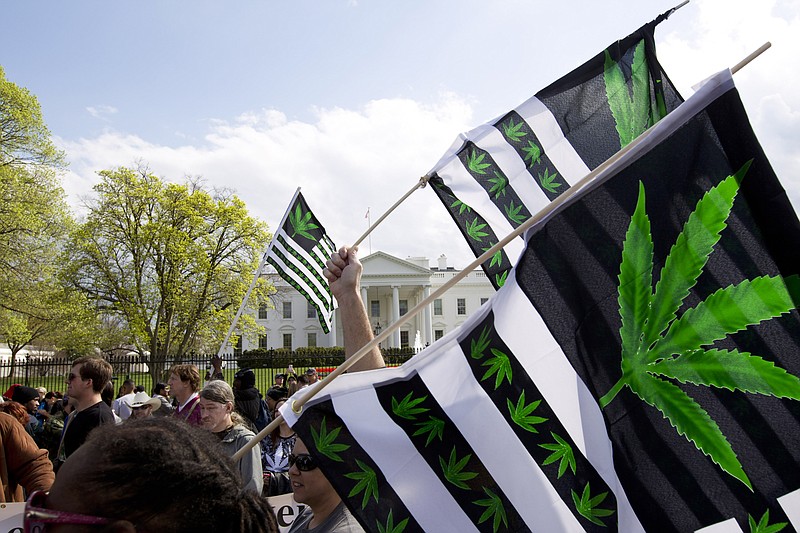Arkansas voters rejected a constitutional amendment to legalize recreational marijuana Tuesday night, a resounding defeat for the state's medical cannabis industry that backed the measure and a victory for social conservatives and those who saw the amendment as a giveaway to the state's medical cannabis industry.
With 88% of votes counted, unofficial returns were:
AGAINST480,960
FOR375,070
The campaign against the amendment, also known as Issue 4, overcame millions of dollars in support from the state's medical marijuana industry as well as a national trend showing support for legalization of the drug.
Along with the recreational marijuana amendment, voters also rejected Issue 1, which would have allowed the state Legislature to call itself back into session, and Issue 2, which would have changed the threshold to pass ballot measures from a simple majority to 60%. Issue 3, the religious freedom amendment, was too close to call at deadline.
Arkansas was one of five states to vote on legalizing marijuana Tuesday night.
For those who campaigned against the amendment, Tuesday's results reflect that Arkansas, as a largely rural, conservative and religious state, is not ready to legalize the drug.
Many opponents of Issue 4 said marijuana was a "gateway" drug that would worsen the state's addiction crisis. Others said they worried children would be able to get hold of it through parents because packaging would not have been childproof.
Passage of the amendment would have meant those 21 and older would be able to legally purchase and possess up to 1 ounce of marijuana in Arkansas. If the ballot measure had won, the state could have started issuing licenses to sell recreational marijuana to 120 dispensaries, including the 38 that already have licenses to sell medical marijuana. Up to 20 growers also could have received licenses from the state to grow cannabis for recreational use.
The vote against legalization overcame a $13 million campaign, funded largely by the state's medical marijuana industry. The campaign against the amendment had a broad coalition consisting of social conservatives, the state's Republican establishment and pro-marijuana legalization activists who said the amendment was a highly flawed way to legalize cannabis.
Numerous conservative groups, including the Family Council Action Committee and Safe and Secure Communities, campaigned heavily against the amendment, claiming that legalizing recreational use of marijuana would exacerbate the state's problems with addiction.
Ronald M. Cameron, CEO of the poultry giant Mountaire Corp. and a longtime GOP donor, donated $1.25 million to Safe and Secure Communities. Illinois businessman Richard Uihlein, CEO of Uline, a supplier of packaging and warehouse supplies, also donated $750,000 to the group.
The Arkansas Farm Bureau, State Chamber of Commerce and Trucking Association also urged people to vote against the amendment, saying legal marijuana would become an occupational hazard with more workers high on the job. About a week before Election Day, Gov. Asa Hutchinson spoke at a news conference at the Arkansas State Chamber of Commerce and said it would become harder for future governors to recruit businesses to the state if marijuana was legalized.
Advocates for the amendment pitched voters that marijuana would be strictly regulated and controlled like alcohol. Responsible Growth Arkansas, the group that led the legalization campaign, raised $13 million and spent millions on ads emphasizing that tax from the legalization of marijuana would go toward funding police and cancer research.
Arkansans did not buy the campaign legalization advocates were selling to voters, said Jerry Cox, executive director of the Family Council Action Committee.
"It says to me the voters saw through all the deception that the promoters of Issue 4 were trying to [push]," Cox said.
Cox said he saw the Tuesday night's defeat of the recreational marijuana amendment more as a vote against the campaign backed by millions of industry dollars and a poorly worded question rather than Arkansas voters dismissing the drug altogether.
The nationwide effort to legalize marijuana began when voters in Colorado and Washington approved measures in 2012 to legalize the drug recreationally in 2012. Other states such as California, Illinois, Alaska, Oregon and Michigan soon followed suit.
"We are proud of what we have done and the first time in history that this has been on the ballot, and we are going to go back and look back at what we can do next time and bring it back to the voters in 2024," said Robert McLarty, the campaign director for Issue 4.
It wasn't just anti-cannabis activists who came out against the amendment. Some of Arkansas' leading marijuana legalization advocates, including Melissa Fults and David Couch, campaigned against Issue 4.
Fults and Couch, who support legal recreational marijuana, said Issue 4 was a giveaway to the state's medical marijuana industry which would control cannabis through a cartel. They also expressed concerns that the amendment does not expunge the records of those with previous convictions for low-level marijuana crimes.
In 2016 Arkansas voters approved a constitutional amendment that legalized medical marijuana. Since medical dispensaries began selling the drug in 2019, patients have spent $700 million on medical cannabis in Arkansas.
There are 38 medical cannabis dispensaries in Arkansas, and the Medical Marijuana Commission is expected to issue two more licenses later this year, according to Scott Hardin, a spokesman for the Department of Finance and Administration.
Currently 90,148 Arkansans have medical marijuana ID cards.
